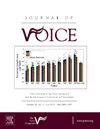Exploring Personality and Perceived Present Control as Factors in Postsurgical Voice Rest: A Case Comparison
IF 2.5
4区 医学
Q1 AUDIOLOGY & SPEECH-LANGUAGE PATHOLOGY
引用次数: 0
Abstract
Objective
This case comparison explored the relation between personality, perceived present control, and postoperative voice rest (as estimated by self-report and objective voice use) following surgery for benign vocal fold lesions.
Method
Two participants were included. Both participants were diagnosed with benign vocal fold pathology, underwent phonosurgery, and were assigned to either complete voice rest (CVR) or relative voice rest (RVR) postoperatively. During voice rest (VR), a visual analog scale (VAS) and a dosimeter (the Vocalog2) were used daily to estimate self-perceived and objective voice use, respectively. The participants also completed questionnaires on voice-related demographics, the Voice Handicap Index (VHI), Ten-Item Personality Inventory (TIPI), and Perceived Present Control (PPC). After 7 days of CVR or RVR, participants completed a postoperative questionnaire and a final VAS for overall voice use.
Results
A wide discrepancy was observed in one of two participant's subjective perception of voice use (using the VAS) versus objective dosimetry data wherein she reported significantly more voice use than was observed objectively. Differences in personality and PPC between the participants did not appear to affect their voice use following the VR protocols.
Conclusion
The amount of voice use in both VR protocols for these two participants suggests that personality and PPC did not affect their adherence to recommendations of VR. Patients may perceive their voice use differently across time, which might play a role in their adherence to voice rest recommendations: voice use measured as instances versus a unit of time (seconds).
探索作为手术后嗓音休息因素的人格和感知当前控制:病例比较
目的: 本病例对比研究了声带良性病变手术后人格、感知当前控制力和术后嗓音休息(根据自我报告和客观用嗓估计)之间的关系:本病例比较探讨了声带良性病变手术后人格、感知到的当前控制力和术后嗓音休息(根据自我报告和客观嗓音使用情况估计)之间的关系:方法:纳入两名参与者。两名受试者均被确诊为声带良性病变,接受了声带手术,术后被分配进行完全静声(CVR)或相对静声(RVR)。在嗓音休息(VR)期间,每天使用视觉模拟量表(VAS)和剂量计(Vocalog2)分别估算自我感觉和客观嗓音使用情况。参与者还填写了与嗓音相关的人口统计学、嗓音障碍指数(VHI)、十项人格量表(TIPI)和感知当前控制(PPC)问卷。接受 CVR 或 RVR 治疗 7 天后,受试者填写一份术后调查问卷,并最后填写一份嗓音总体使用情况 VAS:结果:两名受试者中的一名受试者对嗓音使用情况的主观感受(使用 VAS)与客观剂量测定数据之间存在很大差异,她报告的嗓音使用情况明显多于客观观察到的情况。参与者在性格和 PPC 方面的差异似乎并不影响他们在 VR 方案中的用嗓量:这两名参与者在两个 VR 方案中的语音使用量表明,性格和 PPC 并不影响他们遵守 VR 建议。患者在不同时间段对语音使用的感知可能不同,这可能会影响他们对语音休息建议的遵守情况:语音使用是以实例衡量的,而不是以时间单位(秒)衡量的。
本文章由计算机程序翻译,如有差异,请以英文原文为准。
求助全文
约1分钟内获得全文
求助全文
来源期刊

Journal of Voice
医学-耳鼻喉科学
CiteScore
4.00
自引率
13.60%
发文量
395
审稿时长
59 days
期刊介绍:
The Journal of Voice is widely regarded as the world''s premiere journal for voice medicine and research. This peer-reviewed publication is listed in Index Medicus and is indexed by the Institute for Scientific Information. The journal contains articles written by experts throughout the world on all topics in voice sciences, voice medicine and surgery, and speech-language pathologists'' management of voice-related problems. The journal includes clinical articles, clinical research, and laboratory research. Members of the Foundation receive the journal as a benefit of membership.
 求助内容:
求助内容: 应助结果提醒方式:
应助结果提醒方式:


